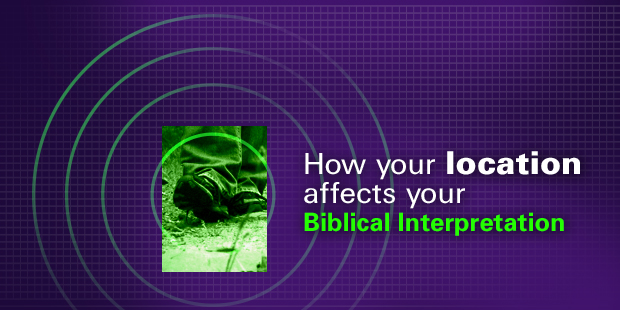
How Your Location Impacts Your Biblical Interpretation
You may be surprised to discover just how much your culture determines what you see in the Scriptures.
During my years in Romania, I found myself challenged by the insights Romanian pastors drew from the text. Preachers seemed to spend time on things that I tended to pass over. Even now, when Corina and I discuss a passage of Scripture, we often latch on to different words and phrases. We’re both inclined to think the other has missed the point and is majoring on the minors.
Cultural background and social location play an important role in the way we read a text.
Did You Notice the Famine?
A great example of this phenomenon is found in Mark Allan Powell’s helpful little book What Do They Hear?: Bridging the Gap Between Pulpit and Pew. Powell recounts an experiment with 12 American seminary students assigned to read the parable of the prodigal son and then recount it from memory. Interestingly enough, not one of them mentioned the famine in Luke 15:14:
After he had spent everything, a severe famine struck that country, and he had nothing.
Powell himself had considered Jesus’ reference to the famine as an insignificant detail, but he was surprised to see all of his students forget it.
Next, Powell organized a study with 100 American students of different genders, races, ages, economic statuses, and religions. Out of 100 students, only 6 mentioned the famine in their retelling of Jesus’ parable.
Perplexed, he went to St. Petersburg, Russia, and did the same experiment with 50 Russians. He was shocked when 42 of them remembered the famine. Only 6 out of 100 Americans, but 42 out of 50 Russians.
Why the disparity? Powell believes there may be a psychological explanation that goes back to 1941, when the German army laid siege to St. Petersburg and caused a 900-day famine in which 670,000 Russians died of starvation and exposure. Even after so many years, the horror of the famine lingers in the consciousness of Russian citizens.
What’s the Prodigal’s Problem?
Even more interesting is the fact that many Russian readers made no reference to the prodigal son squandering his property! People from these two cultures tend to hear the emphases of the parable differently.
The American hears the parable like this:
Not many days later, the younger son gathered together all he had and traveled to a distant country, where he squandered his estate in foolish living. After he had spent everything, a severe famine struck that country, and he had nothing.
The Russian hears the parable like this:
Not many days later, the younger son gathered together all he had and traveled to a distant country, where he squandered his estate in foolish living. After he had spent everything, a severe famine struck that country, and he had nothing.
In other words, Americans see the famine as an insignificant detail that intensifies the prodigal’s big problem – wastefulness. Russians, on the other hand, see the prodigal’s wasteful spending as an insignificant detail that intensifies the real tragedy – the famine.
Social location and cultural background also impact the way we see what the boy did wrong. Americans consider the prodigal’s great sin to be his extravagant, wasteful lifestyle. But in Powell’s study, the Russians didn’t see wastefulness as the biggest problem:
“His mistake was leaving his father’s house in the first place. His sin was placing a price tag on the value of his family, thinking that money was all he needed from them. Once he had his share of the family fortune, the family itself no longer mattered. In a phrase, his sin was wanting to be self-sufficient.” (18)
In a capitalist society, we see the prodigal’s sin in terms of wastefulness. In a socialist society, the Russians see the prodigal’s sin as self-sufficiency.
Know Your Sources and Know Your People
How does this story apply to our preaching and teaching?
First, we ought to consult a variety of sources and scholars as we study the Scriptures. I know pastors who vary their commentaries based on theological diversity. Very well. But perhaps we should also consult commentaries from people in societies different from our own, to see what our cultural blinders may have screened out.
Second, we should consider how our sermons fall on the ears of others. We must be aware of the social context of our listeners and consider not only what we mean to say but how it might be heard. In order to get our intended meaning across, we must know the people we are preaching to and be able to understand how they hear us.
Powell mentions how Bible readers often remain “oblivious to what they themselves are bringing to the process, unaware that the sorting and organizing of data is influenced by particular factors of their own social location. People who hear our sermons do the same thing – they sort the auditory data, prioritizing, organizing, remembering, forgetting: they create a meaning that seems appropriate to them with little awareness of the extent to which their social location has influenced that process” (19).
Better Bible interpretation and better preaching happens when we keep social location and cultural background in mind: the social location of the Scriptures, of ourselves as interpreters, and of those who hear us preach.
Read more from Trevin here.

Tags: Local Predicament, Scripture, Trevin Wax












